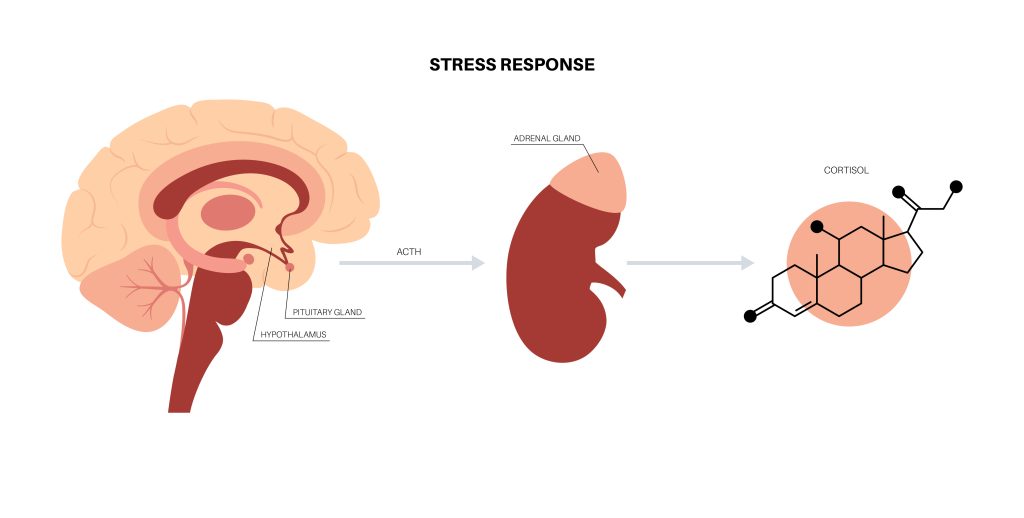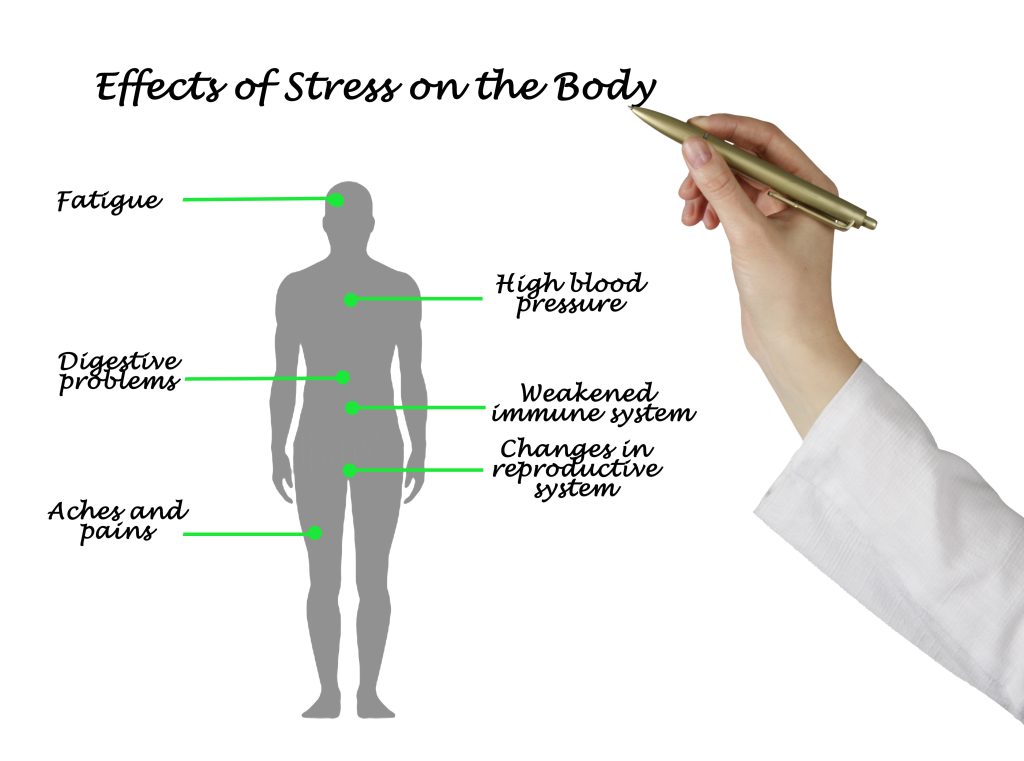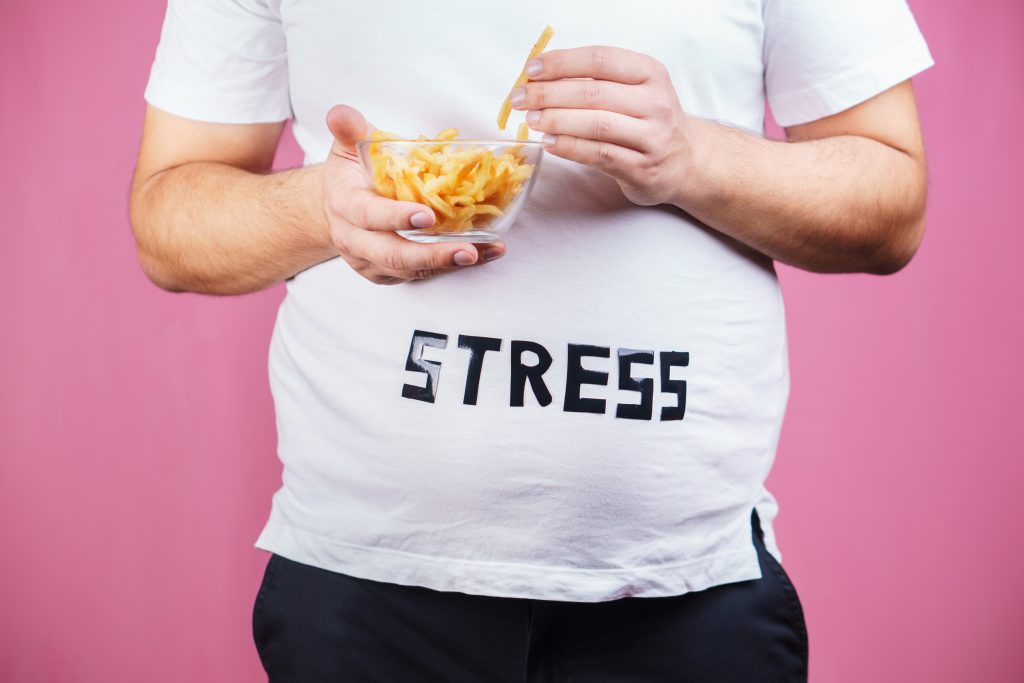How Does Stress Cause Disease And How To Adapt To Stress
Stress is a killer, we all know that, but how does stress cause disease? Stress is commonplace in daily life and we all have to deal with it on some level. While it is normal to experience stress from time to time, chronic stress has negative effects on our health. In fact, chronic stress has been linked directly to the development of many diseases.1
Stress is the body’s natural response to perceived threats or demands. It triggers the release of hormones like adrenaline and cortisol, which prepare the body for a fight or flight response. While this response can be helpful in dangerous situations, chronic stress is detrimental to our well-being.
How Does Stress Cause Disease – Hormonal Imbalances
In addition to the physical symptoms of stress, such as headaches, fatigue, and muscle tension, chronic stress also has a significant impact on our hormonal balance. Our bodies release hormones in response to stress, which affect various systems and organs throughout the body.
One of the main hormones involved in our stress response is cortisol. Produced by the adrenal glands, cortisol helps regulate our fight or flight response and keeps us alert in times of danger. However, chronic stress leads to constantly elevated levels of cortisol, which disrupts other hormonal processes in the body.2
One major way that stress affects our hormones is through the hypothalamic-pituitary-adrenal (HPA) axis. This is a complex system involving communication between the hypothalamus and pituitary glands in the brain, as well as the adrenal glands. When we experience stress, the hypothalamus releases a hormone called corticotropin-releasing hormone (CRH), which signals the pituitary gland to release another hormone called adrenocorticotropic hormone (ACTH). ACTH then stimulates the adrenal glands to produce cortisol.3

Chronic stress leads to dysregulation of the HPA axis, causing it to produce higher levels of cortisol and other hormones. This imbalance has a cascading effect on other hormonal systems in the body, including reproductive hormones such as estrogen and testosterone, as well as thyroid hormones.4 5 6
This disruption of our hormonal balance contributes to a variety of health issues, including infertility, menstrual irregularities, and thyroid disorders. Additionally, chronic stress has been linked to an increased risk of developing autoimmune diseases, as well as metabolic disorders and obesity.7 8 9
Furthermore, stress also affects our mood and behavior through its impact on cortisol as well as other neurotransmitters in the brain. Imbalances in these chemicals often lead to symptoms of anxiety, depression, and even insomnia.10
It’s important to note that the effects of stress on our hormonal balance vary from person to person. Some individuals may be more sensitive to these imbalances, while others may have a stronger ability to regulate their hormones. In other words, it is not the stress itself, but how an individual adapts to this stress that matters. More on this later.
How Does Stress Cause Disease – Anxiety
One common result of excessive stress is anxiety. Anxiety disorders are the most common mental illness in the United States, affecting millions of adults and children. It is also estimated that around 31% of adults will experience an anxiety disorder at some point in their lives.11 12
While there are various factors that contribute to the development of anxiety disorders, chronic stress is a significant contributor. Prolonged cortisol release leads to imbalances in our body’s stress response system, increasing our risk for anxiety disorders.13
How Does Stress Cause Disease – Immune System Dysfunction
One way that stress leads to disease is through its impact on our immune system. Again, cortisol is to blame, as it suppresses our immune system and makes us more vulnerable to infections and diseases.14
When stress disrupts the balance of our immune system, it triggers an overproduction of inflammatory cytokines, which are signaling proteins that promote inflammation in the body. This inflammation contributes to a variety of health issues such as cardiovascular disease and digestive disorders.15
Moreover, stress affects the production and function of our immune cells. For example, chronic stress has been shown to decrease the number and activity of natural killer cells, which are responsible for fighting off viruses. This makes us more susceptible to illnesses and infections.16
Furthermore, stress also affects the communication between our nervous system and immune system. Chronic stress disrupts the balance of neurotransmitters, such as serotonin and dopamine, which play a crucial role in regulating our immune response.17

How Does Stress Cause Disease – Cardiovascular Issues
Another way that stress causes disease is through its effect on our cardiovascular system. Chronic stress causes an increase in blood pressure and heart rate, which puts a strain on our heart and blood vessels. This often leads to the development of cardiovascular diseases such as heart disease and stroke.18
How Does Stress Cause Disease – Digestive Distress
Stress also affects our digestive system. When we are stressed, our body releases hormones that slow down digestion and decrease blood flow to the stomach. This often results in digestive issues such as stomach aches, constipation, and diarrhea. Chronic stress has also been linked to the development of gastrointestinal disorders such as irritable bowel syndrome.19
Read more about IBS.
How Does Stress Cause Disease – Mental Health Issues
In addition to physical health, chronic stress can also have a negative impact on our mental well-being. It can lead to the development or exacerbation of mental health disorders. This is because stress disrupts the balance of neurotransmitters in our brain, which are responsible for regulating our mood and emotions.20
How Does Stress Cause Disease – Sleep Difficulties
The relationship between stress and sleep difficulties is a vicious cycle. Stress disrupts our sleep, leading to poor quality sleep or even insomnia. On the other hand, lack of quality sleep can also contribute to higher levels of stress as we struggle to cope with daily tasks and responsibilities.
Moreover, when we are stressed, our minds tend to race and worry about the source of our stress, making it difficult to fall asleep. This can lead to a negative feedback loop where lack of sleep causes more stress, which in turn leads to more sleep difficulties.21
How Does Stress Cause Disease – Weight Gain
One common effect of prolonged stress is weight gain. This happens due to various reasons such as increased appetite, unhealthy food choices, and disrupted sleep patterns.
Cortisol triggers the release of glucose into the bloodstream to provide energy. However, if this extra energy is not used up, it is stored as fat in the body, leading to weight gain.22
Moreover, cortisol also stimulates the release of another hormone called ghrelin, which is responsible for signaling hunger. This can make us crave unhealthy, high-calorie foods as a coping mechanism to deal with stress.23
When we are stressed, we tend to reach out for comfort foods that are high in fat, sugar, and salt. These foods trigger pleasure centers in our brain and temporarily make us feel better. However, constantly indulging in these foods generally leads to weight gain and a higher risk of developing obesity-related diseases.
Additionally, our busy lifestyles during periods of stress also result in making unhealthy food choices due to lack of time or energy to cook nutritious meals. This cycle further contributes to weight gain.
Read more about how to avoid weight gain.

How Does Stress Cause Disease And How To Adapt To Stress
Everyone has a certain amount of stress, however, the inability to adapt to stress is the underlying issue. For instance, stress becomes a serious health issue if we perceive a small amount of stress as debilitating. If small inconveniences result in significant stress, take a deep breath, take a minute to reflect on the situation, and consider the real issue at hand. Managing stress requires identifying its root cause. Once you know what’s causing your stress, you can take steps to address it head on.
Relaxation techniques like deep breathing, meditation, and yoga help reduce stress levels and promote feelings of calmness. Take a few minutes every day to practice these techniques and see how they improve your overall well-being. Exercise is a great way to relieve stress and boost your mood. It releases feel-good hormones like endorphins, which can improve your mental and emotional state. Aim for at least 30 minutes of moderate exercise each day. Regular exercise can be helpful in normalizing cortisol levels and improving mood.24
Social support is crucial for managing stress. Talking to friends or loved ones about your feelings can help you gain perspective and feel supported. Make time for social activities and reach out to loved ones regularly.
If your stress levels are affecting your daily life and you’re having trouble coping, don’t hesitate to seek professional help. A therapist or counselor can provide you with tools and strategies for managing stress and improving your overall well-being.
How Does Stress Cause Disease And How To Adapt To Stress
While stress is a natural part of life, chronic and unmanaged stress has a significant impact on our health. It is important to find healthy ways to cope with stress and prioritize self-care in order to maintain overall well-being. This can include practicing relaxation techniques, exercising regularly, maintaining a balanced diet, and seeking support from loved ones or mental health professionals when needed. By managing stress, we can help prevent the development of diseases and improve our overall quality of life.
Read more about improving your health.
References
1 Yaribeygi H, Panahi Y, Sahraei H, Johnston TP, Sahebkar A. The impact of stress on body function: A review. EXCLI J. 2017 Jul 21;16:1057-1072. doi: 10.17179/excli2017-480. PMID: 28900385; PMCID: PMC5579396.
2 Cay M, Ucar C, Senol D, Cevirgen F, Ozbag D, Altay Z, Yildiz S. Effect of increase in cortisol level due to stress in healthy young individuals on dynamic and static balance scores. North Clin Istanb. 2018 May 29;5(4):295-301. doi: 10.14744/nci.2017.42103. PMID: 30859159; PMCID: PMC6371989.
3 Stephens MA, Wand G. Stress and the HPA axis: role of glucocorticoids in alcohol dependence. Alcohol Res. 2012;34(4):468-83. PMID: 23584113; PMCID: PMC3860380.
4 Albert KM, Newhouse PA. Estrogen, Stress, and Depression: Cognitive and Biological Interactions. Annu Rev Clin Psychol. 2019 May 7;15:399-423. doi: 10.1146/annurev-clinpsy-050718-095557. Epub 2019 Feb 20. PMID: 30786242; PMCID: PMC9673602.
5 Afrisham R, Sadegh-Nejadi S, SoliemaniFar O, Kooti W, Ashtary-Larky D, Alamiri F, Aberomand M, Najjar-Asl S, Khaneh-Keshi A. Salivary Testosterone Levels Under Psychological Stress and Its Relationship with Rumination and Five Personality Traits in Medical Students. Psychiatry Investig. 2016 Nov;13(6):637-643. doi: 10.4306/pi.2016.13.6.637. Epub 2016 Nov 24. PMID: 27909455; PMCID: PMC5128352.
6 Helmreich DL, Tylee D. Thyroid hormone regulation by stress and behavioral differences in adult male rats. Horm Behav. 2011 Aug;60(3):284-91. doi: 10.1016/j.yhbeh.2011.06.003. Epub 2011 Jun 12. PMID: 21689656; PMCID: PMC3148770.
7 Stojanovich L, Marisavljevich D. Stress as a trigger of autoimmune disease. Autoimmun Rev. 2008 Jan;7(3):209-13. doi: 10.1016/j.autrev.2007.11.007. Epub 2007 Nov 29. PMID: 18190880.
8 Ryan KK. Stress and Metabolic Disease. In: Committee on Population; Division of Behavioral and Social Sciences and Education; National Research Council; Weinstein M, Lane MA, editors. Sociality, Hierarchy, Health: Comparative Biodemography: A Collection of Papers. Washington (DC): National Academies Press (US); 2014 Sep 22. 11. Available from: https://www.ncbi.nlm.nih.gov/books/NBK242443/
9 Tomiyama AJ. Stress and Obesity. Annu Rev Psychol. 2019 Jan 4;70:703-718. doi: 10.1146/annurev-psych-010418-102936. Epub 2018 Jun 21. PMID: 29927688.
10 Giles GE, Mahoney CR, Brunyé TT, Taylor HA, Kanarek RB. Stress effects on mood, HPA axis, and autonomic response: comparison of three psychosocial stress paradigms. PLoS One. 2014 Dec 12;9(12):e113618. doi: 10.1371/journal.pone.0113618. PMID: 25502466; PMCID: PMC4264740.
11 Bandelow B, Michaelis S, Wedekind D. Treatment of anxiety disorders. Dialogues Clin Neurosci. 2017 Jun;19(2):93-107. doi: 10.31887/DCNS.2017.19.2/bbandelow. PMID: 28867934; PMCID: PMC5573566.
12 Harvard Medical School, 2007. National Comorbidity Survey (NCS). (2017, August 21). Retrieved from https://www.hcp.med.harvard.edu/ncs/index.php.
13 Hornstein C. Ansiedad, estrés y enfermedad cardiovascular: un abordaje interdisciplinario [Stress, anxiety and cardiovascular disease: an interdisciplinary approach]. Vertex. 2004;15 Suppl 1:21-31. Spanish. PMID: 15505691.
14 Dhabhar FS. Effects of stress on immune function: the good, the bad, and the beautiful. Immunol Res. 2014 May;58(2-3):193-210. doi: 10.1007/s12026-014-8517-0. PMID: 24798553.
15 Noushad S, Ahmed S, Ansari B, Mustafa UH, Saleem Y, Hazrat H. Physiological biomarkers of chronic stress: A systematic review. Int J Health Sci (Qassim). 2021 Sep-Oct;15(5):46-59. PMID: 34548863; PMCID: PMC8434839.
16 Zhang L, Pan J, Chen W, Jiang J, Huang J. Chronic stress-induced immune dysregulation in cancer: implications for initiation, progression, metastasis, and treatment. Am J Cancer Res. 2020 May 1;10(5):1294-1307. PMID: 32509380; PMCID: PMC7269780.
17 Kumar A, Rinwa P, Kaur G, Machawal L. Stress: Neurobiology, consequences and management. J Pharm Bioallied Sci. 2013 Apr;5(2):91-7. doi: 10.4103/0975-7406.111818. PMID: 23833514; PMCID: PMC3697199.
18 Dar T, Radfar A, Abohashem S, Pitman RK, Tawakol A, Osborne MT. Psychosocial Stress and Cardiovascular Disease. Curr Treat Options Cardiovasc Med. 2019 Apr 26;21(5):23. doi: 10.1007/s11936-019-0724-5. PMID: 31028483; PMCID: PMC6568256.
19 Konturek PC, Brzozowski T, Konturek SJ. Stress and the gut: pathophysiology, clinical consequences, diagnostic approach and treatment options. J Physiol Pharmacol. 2011 Dec;62(6):591-9. PMID: 22314561.
20 Mariotti A. The effects of chronic stress on health: new insights into the molecular mechanisms of brain-body communication. Future Sci OA. 2015 Nov 1;1(3):FSO23. doi: 10.4155/fso.15.21. PMID: 28031896; PMCID: PMC5137920.
21 Kalmbach DA, Anderson JR, Drake CL. The impact of stress on sleep: Pathogenic sleep reactivity as a vulnerability to insomnia and circadian disorders. J Sleep Res. 2018 Dec;27(6):e12710. doi: 10.1111/jsr.12710. Epub 2018 May 24. PMID: 29797753; PMCID: PMC7045300.
22 van der Valk ES, Savas M, van Rossum EFC. Stress and Obesity: Are There More Susceptible Individuals? Curr Obes Rep. 2018 Jun;7(2):193-203. doi: 10.1007/s13679-018-0306-y. PMID: 29663153; PMCID: PMC5958156.
23 Chao AM, Jastreboff AM, White MA, Grilo CM, Sinha R. Stress, cortisol, and other appetite-related hormones: Prospective prediction of 6-month changes in food cravings and weight. Obesity (Silver Spring). 2017 Apr;25(4):713-720. doi: 10.1002/oby.21790. PMID: 28349668; PMCID: PMC5373497.
24 Nowacka-Chmielewska M, Grabowska K, Grabowski M, Meybohm P, Burek M, Małecki A. Running from Stress: Neurobiological Mechanisms of Exercise-Induced Stress Resilience. Int J Mol Sci. 2022 Nov 1;23(21):13348. doi: 10.3390/ijms232113348. PMID: 36362131; PMCID: PMC9654650.




